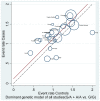Cyclin D1 G870A polymorphism contributes to colorectal cancer susceptibility: evidence from a systematic review of 22 case-control studies
- PMID: 22606291
- PMCID: PMC3350479
- DOI: 10.1371/journal.pone.0036813
Cyclin D1 G870A polymorphism contributes to colorectal cancer susceptibility: evidence from a systematic review of 22 case-control studies
Abstract
Background: Cyclin D1 (CCND1) plays a vital role in cancer cell cycle progression. Numerous epidemiological studies have evaluated the association between the CCND1 G870A polymorphism and the risk of colorectal cancer. However, these studies have yielded conflicting results. To derive a more precise estimation of this association, we conducted a meta-analysis and systematic review.
Methodology/principal findings: A comprehensive search was conducted to identify eligible studies of the CCND1 G870A polymorphism and colorectal cancer risk. Pooled odds ratios (ORs) with 95% confidence intervals (CIs) were derived from a fixed effect or random effect model. We applied a grading system (Venice criteria) that assessed the epidemiological strength of the association. A total of 22 publications that included 6157 cases and 8198 controls were identified. We found that the CCND1 G870A polymorphism was significantly associated with overall colorectal cancer risk (homozygote genetic model: OR = 1.130, 95% CI = 1.023-1.248, P = 0.016; heterozygote genetic model: OR = 1.124, 95% CI = 1.030-1.226, P = 0.009; dominant genetic model: OR = 1.127, 95% CI = 1.037-1.224, P = 0.005). After further stratified analyses, the increased risk was observed only in the subgroups of hospital-based studies, PCR-RFLP genotyping methods, sporadic colorectal cancer, and Caucasian ethnicity.
Conclusions: The available evidence demonstrates that the CCND1 870A allele might be a low-penetrant risk factor for colorectal cancer.
Conflict of interest statement
Figures




Similar articles
-
The association between CCND1 G870A polymorphism and colorectal cancer risk: A meta-analysis.Medicine (Baltimore). 2017 Oct;96(42):e8269. doi: 10.1097/MD.0000000000008269. Medicine (Baltimore). 2017. PMID: 29049220 Free PMC article. Review.
-
CCND1 G870A polymorphism and cervical cancer risk: a case-control study and meta-analysis.J Cancer Res Clin Oncol. 2011 Mar;137(3):489-94. doi: 10.1007/s00432-010-0904-x. Epub 2010 May 15. J Cancer Res Clin Oncol. 2011. PMID: 20473525 Free PMC article.
-
Selenium for preventing cancer.Cochrane Database Syst Rev. 2018 Jan 29;1(1):CD005195. doi: 10.1002/14651858.CD005195.pub4. Cochrane Database Syst Rev. 2018. PMID: 29376219 Free PMC article.
-
Systemic pharmacological treatments for chronic plaque psoriasis: a network meta-analysis.Cochrane Database Syst Rev. 2021 Apr 19;4(4):CD011535. doi: 10.1002/14651858.CD011535.pub4. Cochrane Database Syst Rev. 2021. Update in: Cochrane Database Syst Rev. 2022 May 23;5:CD011535. doi: 10.1002/14651858.CD011535.pub5. PMID: 33871055 Free PMC article. Updated.
-
Interventions for promoting habitual exercise in people living with and beyond cancer.Cochrane Database Syst Rev. 2018 Sep 19;9(9):CD010192. doi: 10.1002/14651858.CD010192.pub3. Cochrane Database Syst Rev. 2018. PMID: 30229557 Free PMC article.
Cited by
-
In-depth analysis of the critical genes and pathways in colorectal cancer.Int J Mol Med. 2015 Oct;36(4):923-30. doi: 10.3892/ijmm.2015.2298. Epub 2015 Jul 30. Int J Mol Med. 2015. PMID: 26239303 Free PMC article.
-
A genetic variant in microRNA target site of TGF-β signaling pathway increases the risk of colorectal cancer in a Chinese population.Tumour Biol. 2014 May;35(5):4301-6. doi: 10.1007/s13277-013-1562-9. Epub 2013 Dec 29. Tumour Biol. 2014. PMID: 24375256
-
Identification of Genetic Susceptibility Loci for Colorectal Tumors in a Genome-Wide Meta-analysis.Gastroenterology. 2013 Apr;144(4):799-807.e24. doi: 10.1053/j.gastro.2012.12.020. Epub 2012 Dec 22. Gastroenterology. 2013. PMID: 23266556 Free PMC article. Review.
-
Contribution of cyclin D1 (CCND1) and E-cadherin (CDH1) alterations to colorectal cancer susceptibility: a case-control study.Tumour Biol. 2014 Dec;35(12):12059-67. doi: 10.1007/s13277-014-2505-9. Epub 2014 Aug 22. Tumour Biol. 2014. PMID: 25146682
-
Mechanism analysis of colorectal cancer according to the microRNA expression profile.Oncol Lett. 2016 Oct;12(4):2329-2336. doi: 10.3892/ol.2016.5027. Epub 2016 Aug 16. Oncol Lett. 2016. PMID: 27698796 Free PMC article.
References
-
- Jemal A, Siegel R, Xu J, Ward E. Cancer statistics, 2010. CA Cancer J Clin. 2010;60:277–300. - PubMed
-
- Ferlay J, Parkin DM, Steliarova-Foucher E. Estimates of cancer incidence and mortality in Europe in 2008. Eur J Cancer. 2010;46:765–781. - PubMed
-
- Vogelstein B, Fearon ER, Hamilton SR, Kern SE, Preisinger AC, et al. Genetic alterations during colorectal-tumor development. N Engl J Med. 1988;319:525–532. - PubMed
-
- Cunningham D, Atkin W, Lenz HJ, Lynch HT, Minsky B, et al. Colorectal cancer. Lancet. 2010;375:1030–1047. - PubMed
Publication types
MeSH terms
Substances
LinkOut - more resources
Full Text Sources
Other Literature Sources
Medical
Research Materials

